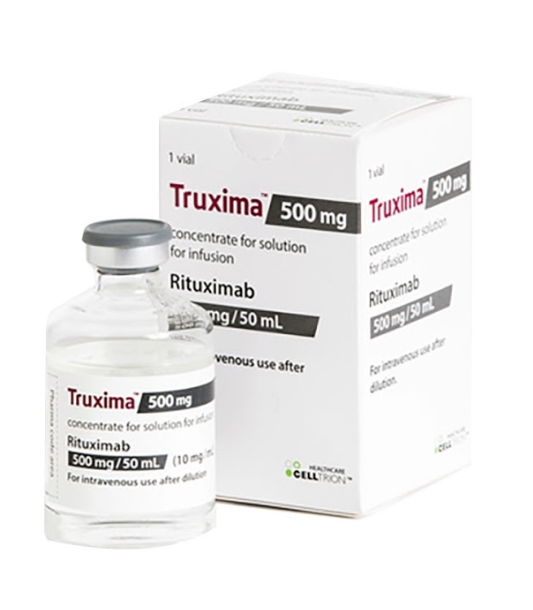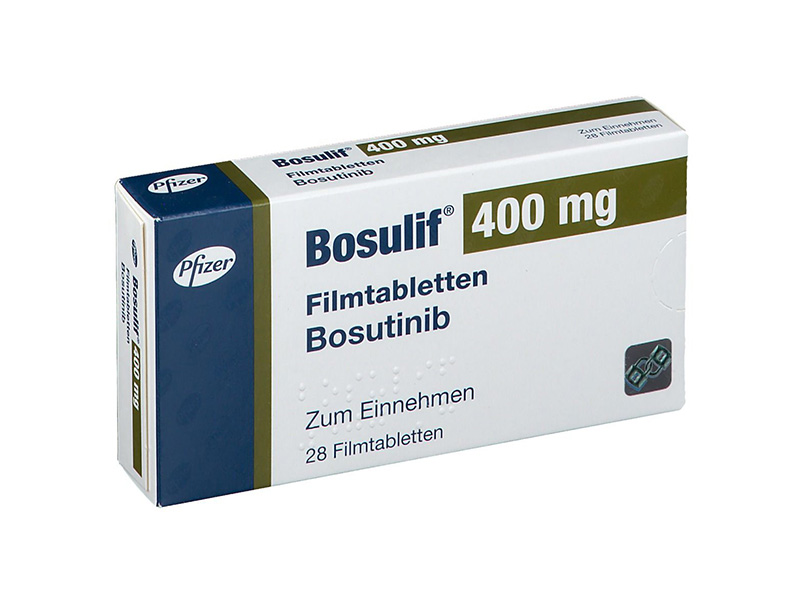Truxima (rituximab) vs Bosulif (bosutinib)
Truxima (rituximab) vs Bosulif (bosutinib)
Truxima (rituximab) and Bosulif (bosutinib) are used to treat different medical conditions: Truxima is a monoclonal antibody used primarily for certain types of blood cancers, such as non-Hodgkin lymphoma and chronic lymphocytic leukemia, as well as autoimmune diseases like rheumatoid arthritis. Bosulif, on the other hand, is a tyrosine kinase inhibitor indicated for the treatment of chronic myelogenous leukemia (CML) with resistance or intolerance to prior therapy. When deciding which medication is appropriate, it is crucial to consider the specific type and stage of cancer, as well as individual patient factors and previous treatments, under the guidance of a healthcare professional.
Difference between Truxima and Bosulif
| Metric | Truxima (rituximab) | Bosulif (bosutinib) |
|---|---|---|
| Generic name | Rituximab | Bosutinib |
| Indications | Non-Hodgkin's lymphoma, chronic lymphocytic leukemia, rheumatoid arthritis, granulomatosis with polyangiitis, and microscopic polyangiitis | Chronic myelogenous leukemia (CML) |
| Mechanism of action | CD20-directed cytolytic antibody | Tyrosine kinase inhibitor |
| Brand names | Truxima, Rituxan, MabThera | Bosulif |
| Administrative route | Intravenous infusion | Oral |
| Side effects | Infusion reactions, fever, lymphopenia, chills, infection | Diarrhea, nausea, thrombocytopenia, rash, abdominal pain |
| Contraindications | Severe active infections, severe immunodeficiency | Hypersensitivity to bosutinib or any component of the formulation |
| Drug class | Monoclonal antibody | Tyrosine kinase inhibitor |
| Manufacturer | Celltrion Healthcare, Teva Pharmaceuticals, Genentech (Roche) | Pfizer |
Efficacy
Truxima (Rituximab) Efficacy in Leukemia
Truxima, a biosimilar to the original rituximab, is a monoclonal antibody that targets the CD20 antigen on the surface of B-cells. It is used in the treatment of several types of blood cancers, including some forms of leukemia. In chronic lymphocytic leukemia (CLL), rituximab has been shown to be effective when used in combination with chemotherapy. The efficacy of rituximab in CLL is primarily measured by its ability to induce remission, improve survival rates, and reduce the risk of disease progression. Clinical trials have demonstrated that the addition of rituximab to standard chemotherapy regimens can significantly improve outcomes for patients with this type of leukemia.
However, it is important to note that the efficacy of Truxima can vary based on the stage of the disease, the specific characteristics of the leukemia cells, and the patient's overall health and response to treatment. Rituximab is not typically used as a monotherapy in leukemia but rather as part of a combination regimen. The safety and efficacy of Truxima for the treatment of leukemia have been extrapolated from that of the reference product, rituximab, which has been widely studied and used in clinical practice.
Bosulif (Bosutinib) Efficacy in Leukemia
Bosulif, known generically as bosutinib, is a tyrosine kinase inhibitor (TKI) specifically indicated for the treatment of Philadelphia chromosome-positive (Ph+) chronic myelogenous leukemia (CML). Bosutinib has shown efficacy in patients with CML at different stages of the disease, including chronic, accelerated, and blast phase. Its effectiveness is primarily gauged by its ability to achieve cytogenetic and hematologic responses. Clinical trials have indicated that bosutinib is effective in patients who are resistant or intolerant to prior therapy, such as imatinib, another TKI.
Additionally, bosutinib has been evaluated in newly diagnosed chronic phase CML patients. In these cases, it has demonstrated efficacy in achieving major cytogenetic response (MCyR) and complete cytogenetic response (CCyR) rates comparable to or better than some other TKIs. The long-term benefits of bosutinib include progression-free survival and overall survival, although these outcomes are contingent upon the patient's response to treatment and the presence of other prognostic factors. As with any targeted therapy, the presence of specific mutations may affect the efficacy of bosutinib, and resistance can develop over time, necessitating a change in treatment strategy.
Regulatory Agency Approvals
Truxima
-
European Medical Agency (EMA), European Union

-
Food and Drug Administration (FDA), USA

-
Health Canada

-
Therapeutic Goods Administration (TGA), Australia

-
Medsafe (NZ)

Bosulif
-
European Medical Agency (EMA), European Union

-
Food and Drug Administration (FDA), USA

Access Truxima or Bosulif today
If Truxima or Bosulif are not approved or available in your country (e.g. due to supply issues), you can access them via Everyone.org.
How it works

Make an enquiry
Choose the medicine you want to buy, answer a couple of questions, and upload your prescription to speed things up. We’ll get back to you within 24 hours.


Make an enquiry
Choose the medicine you want to buy, answer a couple of questions, and upload your prescription to speed things up. We’ll get back to you within 24 hours.


Breeze through the paperwork
We'll guide you through the required documents for importing unapproved medicine, ensuring you have all the necessary information.


Get a personalized quote
We’ll prepare a quote for you, including medicine costs and any shipping, administrative, or import fees that may apply.


Receive your medicine
Accept the quote and we’ll handle the rest - sourcing and safely delivering your medicine.

Some text on this page has been automatically generated. Speak to your physician before you start a new treatment or medication.
Let's talk
If you have any questions, call us or send us a message through WhatsApp or email:
Contact us




